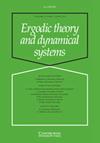Statistical determinism in non-Lipschitz dynamical systems
IF 0.8
3区 数学
Q2 MATHEMATICS
引用次数: 8
Abstract
Abstract We study a class of ordinary differential equations with a non-Lipschitz point singularity that admits non-unique solutions through this point. As a selection criterion, we introduce stochastic regularizations depending on a parameter $\nu $ : the regularized dynamics is globally defined for each $\nu> 0$ , and the original singular system is recovered in the limit of vanishing $\nu $ . We prove that this limit yields a unique statistical solution independent of regularization when the deterministic system possesses a chaotic attractor having a physical measure with the convergence to equilibrium property. In this case, solutions become spontaneously stochastic after passing through the singularity: they are selected randomly with an intrinsic probability distribution.非lipschitz动力系统中的统计决定论
研究了一类具有非lipschitz点奇点的常微分方程,该奇异点允许通过该点的非唯一解。作为选择标准,我们引入了依赖于参数$\nu $的随机正则化:正则化动力学是为每个$\nu>全局定义的;0$,在$\nu $消失的极限内恢复原来的奇异系统。证明了当确定性系统具有具有收敛于平衡性质的物理测度的混沌吸引子时,该极限产生一个独立于正则化的唯一统计解。在这种情况下,解在通过奇点后自发地成为随机的:它们被随机选择,具有内在的概率分布。
本文章由计算机程序翻译,如有差异,请以英文原文为准。
求助全文
约1分钟内获得全文
求助全文
来源期刊
CiteScore
1.70
自引率
11.10%
发文量
113
审稿时长
6-12 weeks
期刊介绍:
Ergodic Theory and Dynamical Systems focuses on a rich variety of research areas which, although diverse, employ as common themes global dynamical methods. The journal provides a focus for this important and flourishing area of mathematics and brings together many major contributions in the field. The journal acts as a forum for central problems of dynamical systems and of interactions of dynamical systems with areas such as differential geometry, number theory, operator algebras, celestial and statistical mechanics, and biology.

 求助内容:
求助内容: 应助结果提醒方式:
应助结果提醒方式:


